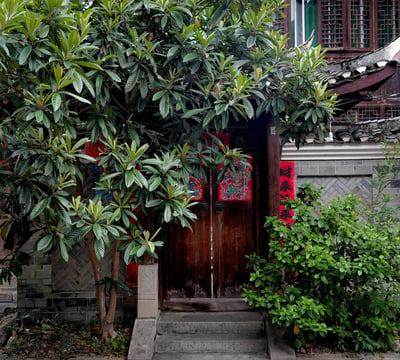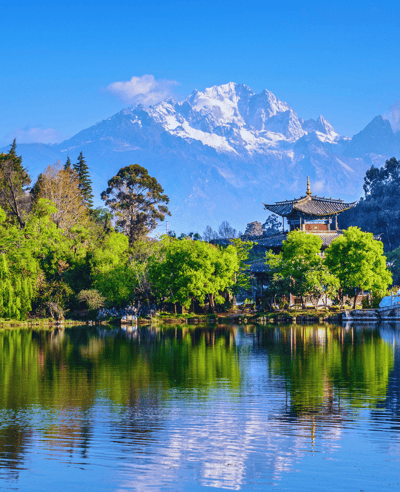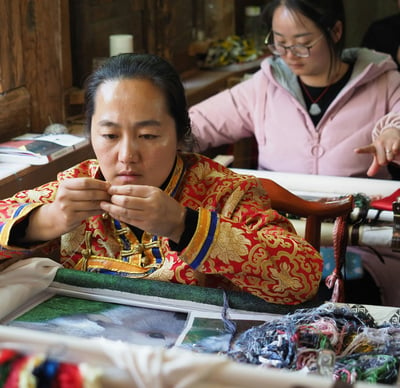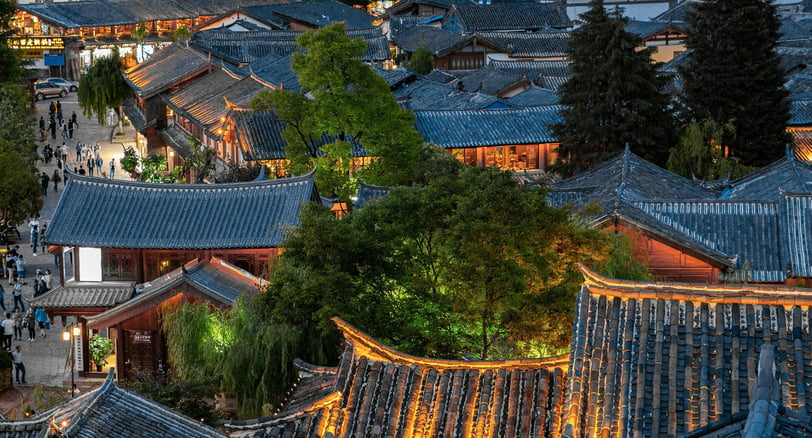Under the Jade Dragon’s Gaze: A Soliloquy in Lijiang


I arrived in Lijiang not with fanfare, but with the slow, humming glide of a train pulling in from Kunming. The journey climbed gently into the highlands, past terraced fields and sleepy villages, through tunnels carved into timeworn mountains. Pines stood like silent sentinels, and the occasional ox-cart reminded me that pace, here, was not a race but a ritual.
When I stepped off the train, the air was thinner, cooler, heavy with the scent of damp stone and woodsmoke. Lijiang smelled ancient: of pine and riverwater, of crushed herbs, of morning tea steeping behind wooden shutters. Even in the early hours, faint traces of sandalwood drifted from open doorways where incense had been lit—ritual, not religion.
The Old Town waited behind stone gates and red lanterns. No cars. No rush. Just the soft percussion of footsteps on worn stone. As I walked, the scent changed—soy sauce from a noodle stall, old paper in a calligrapher’s shop, the dusty musk of books in a sunlit window. Every corner had its own atmosphere.


I found my guesthouse at the edge of the canal, a Naxi-style courtyard with creaking stairs and timber so dark it seemed soaked in memory. The woman who ran it wore her hair braided with a single red thread. She led me to a room on the upper floor. There was no television, no distractions. Only a lattice window that opened to the tiled rooftops and the echo of water below.
At dawn, the streets were silver with mist. I wandered to a small stone bridge and stood watching the water drift beneath me. A man passed, pushing a cart of flower bundles wrapped in red cloth. Somewhere behind me, a bamboo flute began to play—a slow, reedy tune that curved through the fog like breath. That was Lijiang’s sound: quiet wood, water, the occasional knock of teacups against porcelain, and always, the distant hum of music.
The words came to me as I walked alone toward Black Dragon Pool. It was said the best view of Jade Dragon Snow Mountain revealed itself from here—but the mountain was shy that morning. Only its base showed, white-tipped and unmoving, while the summit hid behind a veil of mist.
But that afternoon, the clouds lifted, and I returned once more. This time, the Jade Dragon was not shy. Its full spine arched across the sky, white with ancient snow, its ridges lit gold by the falling sun. The water below mirrored its shape perfectly—two dragons, one in heaven, one below.
I sat on a bench beneath the pavilion, watching its stillness. Unlike mountains that dare you to climb them, this one made no invitation. It simply was—serene, majestic, absolute. You do not conquer the Jade Dragon. You sit under its gaze, and you feel something loosen inside you.
“The birds have vanished into the sky,
And now the last cloud drifts away.
We sit together, the mountain and me,
Until only the mountain remains.”
— Li Bai


Others came and went: a young couple posing for wedding photos, an old man feeding birds with torn pages of newspaper. But no one spoke loudly. The mountain, it seemed, demanded quiet—not through force, but through presence.
I stayed until the sky faded into lavender, until the dragon was only a shadow etched in air. And still, even as I walked away, I felt its gaze remain—like an imprint on the soul, or a poem half-remembered from childhood.
In Baisha Village, just north of the town, I spent an afternoon among herbalists and silk-weavers, where the pace of life had not caught up to the century. A scholar in his sixties introduced me to the Dongba script—written with brush and water, meant to disappear as soon as it appeared. "Like breath," he said. “Like thought.”
Later that evening, I found myself in Dayan Naxi Ancient Music Center, a humble room with wooden benches and a modest stage. Three elders played music older than memory—using instruments like the sanxian, pipa, and guqin. The music moved in circles, never rushing toward a climax. It was not meant to entertain. It was meant to remain. I closed my eyes and drifted with it.


That night, the courtyard of my guesthouse smelled of earth and tea. Rain had fallen, softening the dust. The old woman brought me warm pu’er in a tiny clay cup. We sat together without speaking. Outside, wind rustled prayer flags, and the slow creak of wood settled like a lullaby.
On my final morning, I walked once more along the canal. The city felt unchanged—but I had softened. Something in me had bent gently, like bamboo in mist. I stopped at the same stone bridge and watched the same water. The flute was gone. In its place, birds called from a rooftop garden, their cries echoed once, then disappeared into sky.
I did not take photographs. Only notes. A single line I wrote on the last page of my journal:
“What I found in Lijiang was not a story to tell—
but a silence to keep.”
And as the train pulled away, I thought of the old poet Du Fu, who once wrote:
“A country broken, yet mountains and rivers remain.”
For a broader perspective on Lijiang’s history, culture, and timeless landscapes, explore the comprehensive guide in Desinations — "Lijiang: Where Time Sleeps in the Shadow of Jade Dragon Snow Mountain."
✉️ Contact:
Curated by TrueTrip Hub |
© 2025 Invisible Atlas — All rights reserved.
Invisible Atlas
Journey Beyond the Visible
invisible.atlas@truetriphub.com
